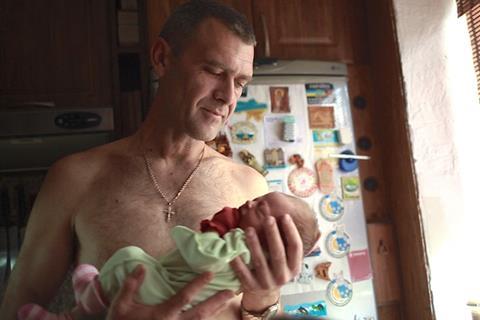The impact of the war in Ukraine is felt through the experiences of a single family in this debut documentary

Dir: Lesia Diak. Ukraine, Romania, Croatia. 2024. 78mins.
As the conflict following Russia’s invasion of Ukraine in February 2022 shows little sign of resolution, documentaries continue to shine a spotlight on its wide-ranging impact. Some, including Oscar-winner Mstyslav Chernov’s 20 Days In Mariupol, have offered a reportage eye on the brutality, while others, such as Sergei Loznitsa’s The Invasion and Oksana Karpovych’s Intercepted, have considered the Ukrainian resistance. Now, debut filmmaker Lesia Diak takes us into the realm of one Ukranian family, as they try to cope with the return of a father who has served three years on the frontline.
An emotional, if at times uneven, watch
A little rough around the edges in terms of shooting style, Diak’s intimate access to the family’s home, along with her willingness to engage in discussion about the impact of war on her own relationship, make for an emotional, if at times uneven, watch. Playing in competition at Sarajevo Film Festival, where it won the Docu Talent work-in-progress award in 2022, Dad’s Lullaby has a family angle which could attract the interest of further festivals going forward.
The lullaby of the title might suggest calm, but the organised chaos of the Zinchuk household is a far cry from that. Dad Serhiy had 70 soldiers under him while he was fighting in the east of the country but, back in Kyiv, his three young sons Nikita, Artem and Sasha are a handful that he’s not used to. Mum Nadiia, meanwhile, has become all too accustomed to wrangling the household in his absence. “How have we managed to survive without you?” she asks drily.
War isn’t easy for the young to process. The spectre of it is there in the kids’ games, which seem to frequently involve tossing imaginary grenades, while the music videos on their phones also feature the conflict. They have questions for dad: “Why did you have to be away for so long?” “Didn’t they want to let you go?” The changed household dynamic starts to take its toll on the family, especially after Nadiia becomes pregnant.
Diak breaks from the straightforward observational technique during several evening conversations she has with Serhiy, in which he turns the camera on her, resulting in footage that is understandably raw. She has also been in a relationship that was affected by the war and Serhiy quizzes her just as she questions him. In its most interesting moment, he also interrogates the documentary’s substance. When she tells him it’s a film “full of love”, he notes that it could equally be edited to show them as “tyrants”.
“We can’t build our lives out of fragments,” he adds, the irony being that, of course, this is what many up and down Ukraine are being forced to do. Serhiy, in particular, struggles with the readjustment, noting food has become tasteless to him and, periodically, revealing grim details of the frontline. He frequently notes that he would like to be alone – something that simply isn’t possible in a full home like this.
It’s a shame there aren’t some direct-to-camera interactions with Nadiia as well. While her love for her lads and frustrations with Serhiy come across through Diak’s observational work, she doesn’t appear to be offered the same outlet as her husband. The arrival of baby Margo brings joy to the household, even while the fractures begin to grow, as everyone tries to accommodate this very different sort of new arrival. The uncertain situation in Ukraine means that many families are caught in a sort of no man’s land, and Diak poignantly shows the battle for normality can be just as difficult as the fight for freedom.
Production companies: DramaFree, FilmWays, Petnaesta umjetnost
International sales: DramaFree lesyadyak@gmail.com
Producers: Lesia Diak, Monica Lazurean-Gorgan, Elena Martin
Cinematography: Lesia Diak, Serhiy Zinchuk
Editing: Andrei Gorgan
Music: Margaryta Kulichova

























No comments yet